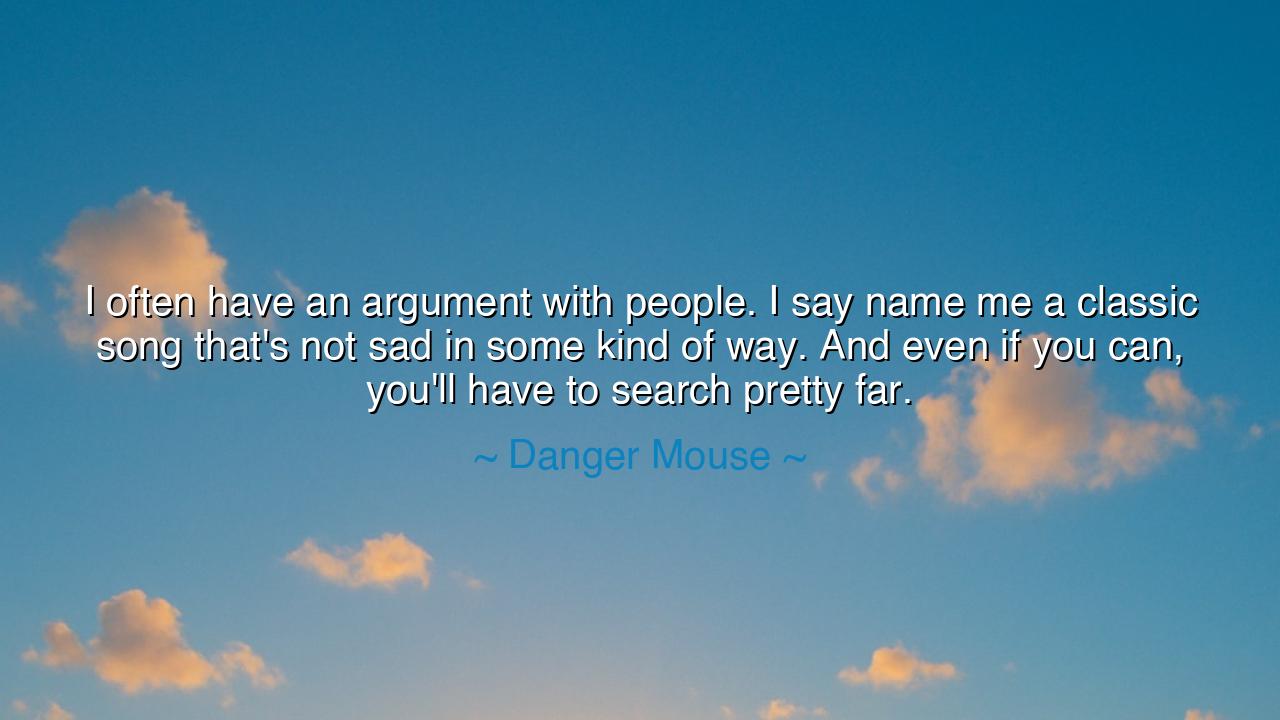
I often have an argument with people. I say name me a classic
I often have an argument with people. I say name me a classic song that's not sad in some kind of way. And even if you can, you'll have to search pretty far.






There is a truth in music that transcends time: it speaks not only to joy, but to sorrow, to the depths of the soul that words alone cannot touch. Danger Mouse once reflected, “I often have an argument with people. I say name me a classic song that's not sad in some kind of way. And even if you can, you'll have to search pretty far.” In these words lies an ancient observation: the most enduring art, whether in sound, word, or gesture, carries within it a trace of sadness. It is through melancholy, he suggests, that music achieves its immortality, connecting us to the shared vulnerabilities of the human heart.
Sadness, in this context, is not weakness—it is truth rendered audible. A classic song endures not because it comforts or entertains, but because it resonates with the complexities of human experience. The minor chord, the wistful lyric, the trembling note—they speak of longing, loss, and the fleeting nature of joy. In this way, music mirrors life itself: even in moments of celebration, there is the awareness of impermanence, the shadow that gives light its meaning. Danger Mouse points to a profound principle: the sublime is always tinged with sorrow.
This idea is echoed through history. Consider Beethoven, whose symphonies and sonatas, though often triumphant in tone, carry an unmistakable weight of struggle and reflection. Even his most celebrated works, such as the Moonlight Sonata, evoke melancholy as their essence. Or think of Billie Holiday, whose voice conveyed both beauty and pain, turning personal suffering into timeless art. These creators understood that sadness is not an obstacle to greatness—it is its conduit, a bridge connecting individual emotion to collective experience.
Danger Mouse challenges us to see sadness as the lifeblood of resonance. When he says that to find a classic song not tinged with sorrow “you'll have to search pretty far,” he highlights the rarity of art that touches us deeply without evoking the bittersweet. Joy alone is ephemeral; it delights in the moment but often fades from memory. Melancholy, in contrast, lingers, prompts reflection, and compels us to listen again. The weight of feeling transforms simple sound into enduring meaning.
In the annals of culture, the most powerful songs and melodies have always borne this duality. The hymns of the Middle Ages, the blues of the Mississippi Delta, the ballads of the Renaissance—they are at once beautiful and sorrowful, capturing the paradox of existence. They remind us that life itself is woven from contrasts: hope and despair, laughter and tears, triumph and loss. To listen deeply is to acknowledge both sides of this coin, and in doing so, to live more fully.
The wisdom in Danger Mouse’s observation extends beyond music. All art that endures—painting, literature, theater—carries within it a trace of sadness. Shakespeare’s comedies contain profound insight into human suffering; Van Gogh’s vivid canvases are charged with the artist’s personal turmoil; the epic poems of Homer recount both heroic glory and devastating loss. Sadness is the soil in which human creativity takes root; without it, expression risks superficiality, and the heart remains untouched.
From this, we may draw a vital lesson: embrace the melancholy in your own life and art. To deny sorrow is to deny depth, to flee discomfort is to flee understanding. The classics endure because they mirror our own vulnerabilities, revealing that even in sadness, there is beauty, connection, and meaning. Listening to a sad song is not surrender—it is recognition of our shared humanity.
Therefore, let the words of Danger Mouse guide both the creator and the listener: seek not only delight in art, but its truth. Let sadness be a companion, a teacher, and a bridge. For it is in the bittersweet, in the poignancy that music conveys, that we encounter the essence of life itself—the depth of emotion that binds us across time, culture, and circumstance. To hear a classic song is to hear the echo of the soul, and that echo is always, inevitably, tinged with sorrow.






AAdministratorAdministrator
Welcome, honored guests. Please leave a comment, we will respond soon